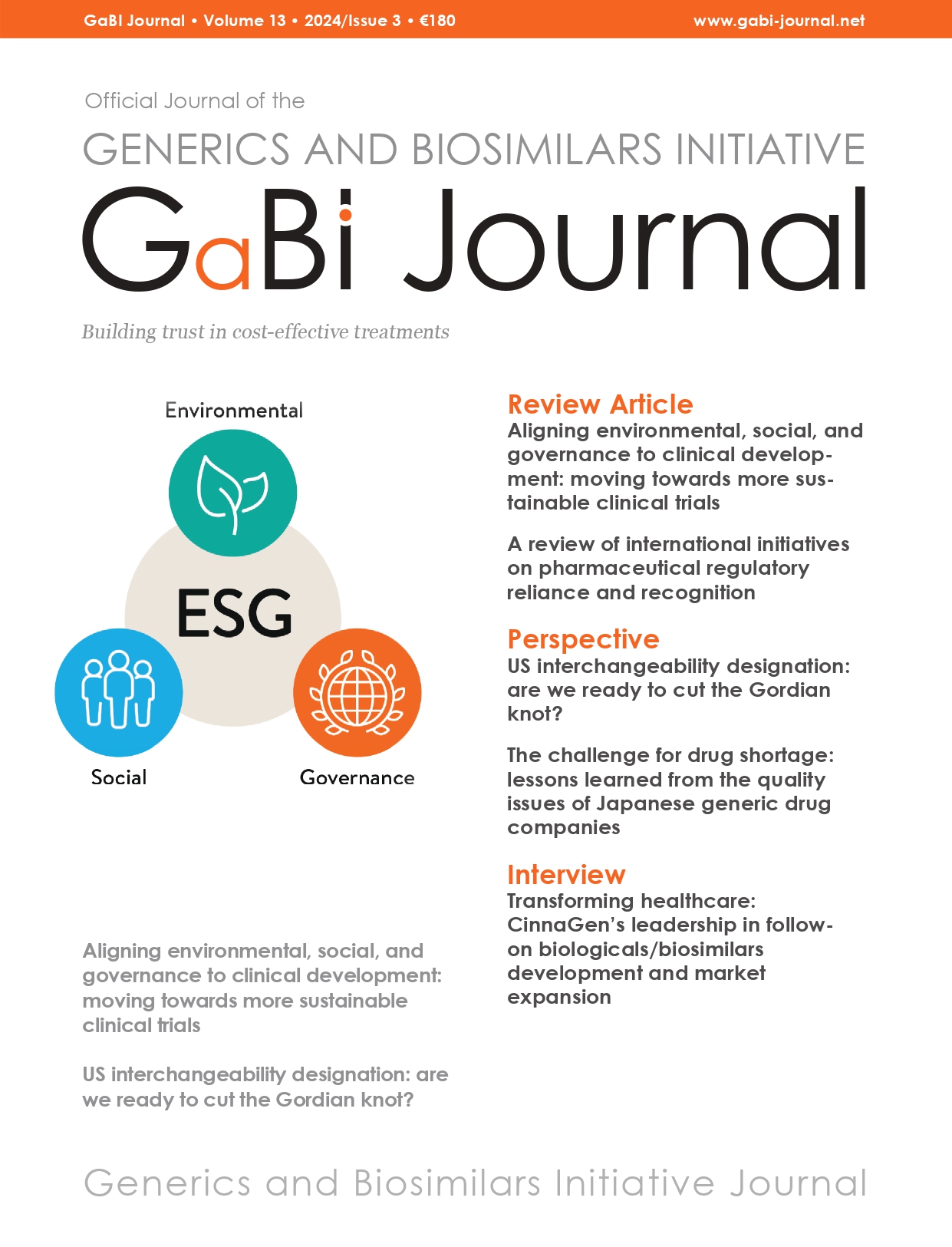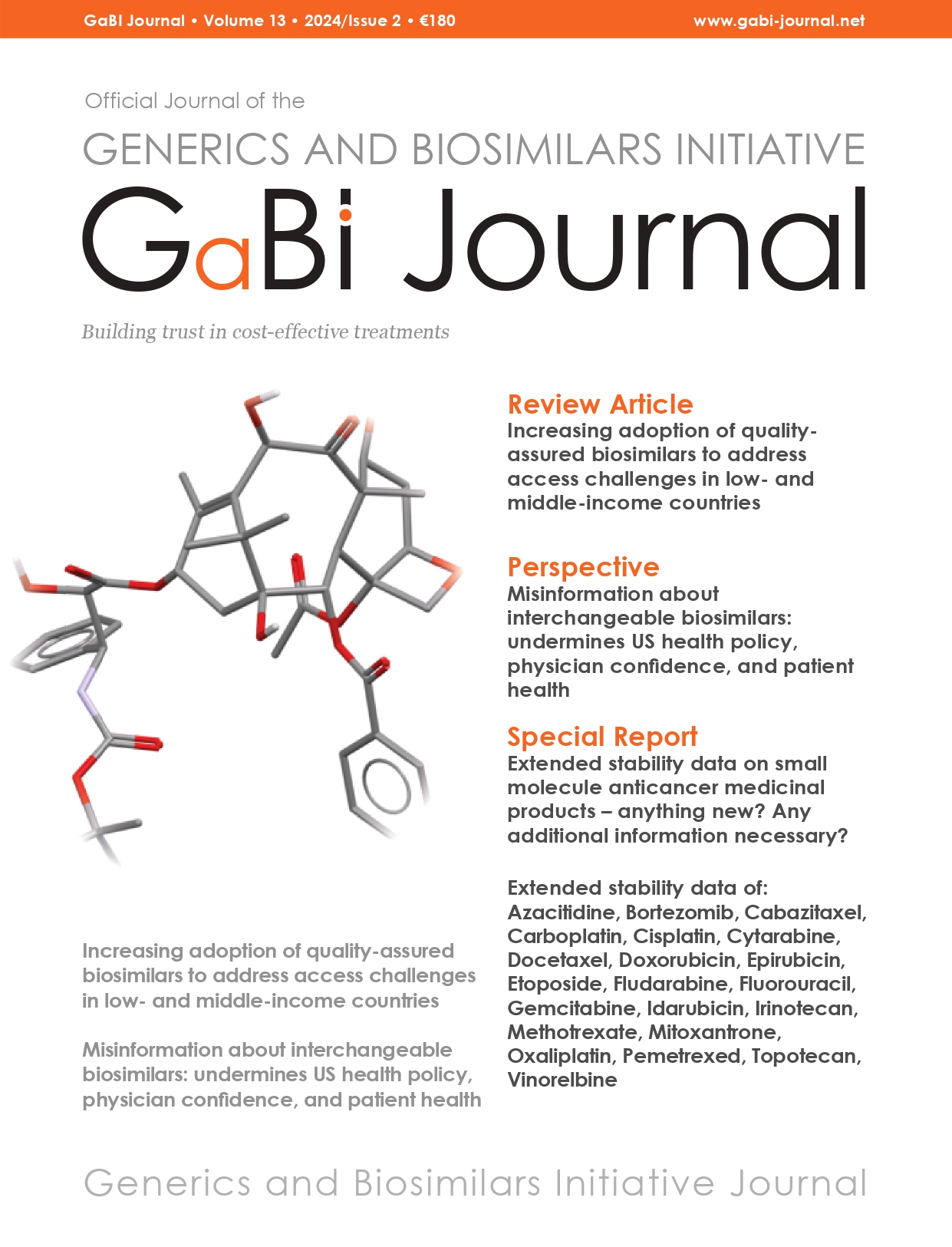Latest features in GaBI Journal, 2019, Issue 3
Published on 2019/11/25
Generics and Biosimilars Initiative Journal (GaBI Journal). 2019;8(3):91-2.
Patients, their families and providers are facing increasing pressures related to the rapidly expanding global inequality which affects access to all components of a long, healthy, productive life including water, food, shelter, medical care, education, a free press, stable government and freedom from both natural and man-made threats including genocide and war. Attempts to increase access to effective and affordable medicines are an important part of attempts by governments, institutions and individuals to mitigate the effects of this inequality.
Canada is an example of a modern, relatively resource rich country which has made important attempts to provide all of its citizens with access to all these components. This issue of the GaBI Journal includes a Review Article by Siu et al. which provides a comprehensive update on the regulation and reimbursement of biosimilars in Canada which are designed to enhance the use by Canadian citizens of biosimilars at competitive prices. The authors discuss a number of important initiatives including mandated switching from originators to biosimilars, changes in regulatory processes and capacity which were initiated to promote faster and greater uptake of biosimilars while monitoring ‘real-world’ safety and efficacy data, as well as efforts undertaken to shift physician and patient attitudes towards more acceptance of biosimilars.
Godman et al. provide a Commentary on the Siu et al. paper in which they discuss the Canadian findings and implications from a global perspective. These authors compare the Canadian situation with regulatory and reimbursement initiatives in other countries which were also designed to improve the affordability of biologicals. Given the fact that wealth discrepancies have only grown larger both between and within countries, one must question whether or how well any of these efforts have/will work to improve patient access even in resource rich countries, let alone in resource poor ones.
Kozlowski et al. in an Original Research paper report results of their study using Medicare Part D claims data to examine the influence of competitive, for-profit, pharmacy chains on the choice of the manufacturers of two generic anticoagulants. The authors report that the specific pharmacy chain had a much larger effect than did the payers or geographic location. The authors discuss the economic implications for generics competition and suggest that the ongoing consolidation of wholesalers and pharmacy chains, ‘may further reduce prices by increasing the bargaining power of wholesalers and pharmacy chains’. While hopeful, I remain skeptical that this and other developments will have a meaningful effect on patients’ access to affordable medicines. In part my skepticism is based on the current pace and direction of global changes required to make this happen.
The first (of two) Meeting Report by Dr Griffiths and Adjunct Associate Professor Chong Hock Sia describes the 2018 1st ASEAN overview workshop on GMP for biologicals/biosimilars. This meeting was held as part of a collaboration between the Association of Southeast Asian Nations (ASEAN), the Generics and Biosimilars Initiative (GaBI). The organizers state that this was, ‘the first workshop of its kind in this region on good manufacturing practices (GMP) for biological drugs (including biosimilars)’.
The meeting was designed to improve the understanding of the good manufacturing practice (GMP) inspection framework for biological (and biosimilar) drugs and focused on the World Health Organization‘s (WHO) GMP for biological products.
The second Special Report by de Vlieger et al. presented a summary of the 3rd International Symposium on Scientific and Regulatory Advances in Biological and Non-Biological Complex Drugs: A to Z in Bioequivalence. This multi-stakeholder meeting was held in Budapest, Hungary on 12–14 November 2018 and was organized by the NBCD Working Group in Utrecht, The Netherlands. Details of the funding sources used to support the meeting were not described. The group’s website lists both commercial, e.g. Allergan and Vifor Pharma International Inc, and non-commercial (University of Geneva) sponsors and states that the organization is, ‘an independent third party with no commercial interest’ which, ‘provides neutral ground to facilitate discussion between stakeholders’. GaBI has previously conducted, with support from unrestricted pharmaceutical company grants, and described similar educational conferences on Non-Biological Complex Drugs. The meeting covered ‘the recent US Government Accountability Organization (GAO) report on non-biological complex drugs (NBCDs) together with the US Food and Drug Administration (FDA) draft guidance on drug products containing nanomaterials and the possibility of global harmonization of regulatory policies regarding NBCD products’. A short summary of the findings included the fact that, ‘Stakeholders … agreed that demonstrating equivalence between brand and generic NBCDs is scientifically challenging, but disagreed about whether challenges can be overcome’ and that while FDA has issued product-specific guidance, ‘stakeholders expressed concerns about its contents, timelines, and lack of advance notice of guidance issuance and revisions’. As mentioned in a prior letter the GaBI Journal encourages readers to comment on this or any other articles and to submit manuscripts dealing with any NBCD related issue.
The final Opinion article is, Why ‘similar’ can make a big difference by Zorana Maravic from the Digestive Cancers Europe’s (DiCE) in Overijse, Belgium. It attempts to explain, ‘what motivated the Digestive Cancers Europe’s (DiCE) recent position paper on biosimilar medicines for colorectal cancer’. The articles focuses on the need for GI (gastro-intestinal) cancer patients to have access to effective and affordable treatments. The author states that DiCE, ‘worked with several patients (and carer) advocates from all over Europe, along with some of the leading healthcare professionals in the area, to develop a position paper on biosimilars’. Details were not provided as to how these participants were selected, whether they were reimbursed or not, or whether/how ‘consensus’ was reached. Also, while the author claims to have “no competing interests”, the DiCE website lists a large number of brand-name pharmaceutical companies as “funding partners” who readers may find might have commercial interest in the limited use of or switching to biosimilar products. The author also does not clarify who he is referring to as “we” in the claims that, ‘we felt it was important to provide a position paper that clearly sets out the current situation with regards to biosimilars in colorectal cancer, and to provide the patient perspective’, ‘We believe equality of access to medicines is a fundamental right for all patients, and we believe there is an important role for biosimilar medicines to play in achieving this in colorectal cancer’ or ‘We believe that if a patient is currently taking an original reference biological medicine, and is stable and responding well to treatment, then they should never be forced to switch to a biosimilar medicine’. The author makes many legitimate points about the “rights” of patients; especially to be heard/listened to. However, there can be conflicts created between the rights of those who can versus those who cannot afford to start or continue on a brand versus biosimilar product. It is possible that allowing some patients to continue on a more expensive product will limit the ability of other patients to receive either product. When do the rights of a few justify loss of access for others and who decides? Readers should note that one of the successful initiatives mentioned in the article by Siu et al. includes mandatory switching.
I encourage readers to send comments, letters or articles covering any aspect of the topics covered in this or any other issues of the GaBI Journal.
Professor Philip D Walson, MD
Editor-in-Chief, GaBI Journal
Disclosure of Conflict of Interest Statement is available upon request.
Copyright © 2019 Pro Pharma Communications International
Permission granted to reproduce for personal and non-commercial use only. All other reproduction, copy or reprinting of all or part of any ‘Content’ found on this website is strictly prohibited without the prior consent of the publisher. Contact the publisher to obtain permission before redistributing.


